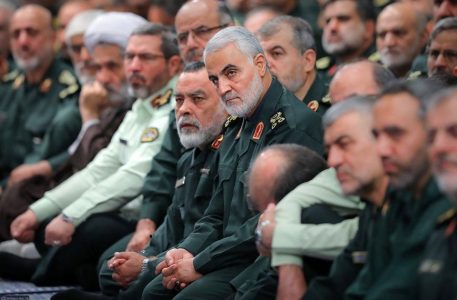
Iranian terrorist cell planned an attack on Albanian soil
Albanian police said on Wednesday they have discovered an Iranian paramilitary network that allegedly planned attacks in Albania against exiled members of an Iranian group seeking to overthrow the government in Tehran.
Police chief Ardi Veliu said the foreign wing of Iran’s Islamic Revolutionary Guard Corps, the Quds Force, operated an “active terrorist cell” targeting Mujahedin-e Khalq, or MEK, group members in Albania.
He did not say what the alleged plot involved, or whether any arrests were made.
A police statement alleged that two senior Iranian security officials commanded the cell from Tehran. It also said the network was allegedly linked with organized crime groups in Turkey and used a former MEK member to collect information in Albania.
Veliu said another planned attack on the group in Albania by Iranian government agents was foiled in March during the Sultan Nevruz day festivities.
“The Albanian authorities have identified these individuals and thanks to intelligence from informants inside the criminal organizations have prevented the planned [attack] of March 2018 and the eventual planning of attacks by organized crime members … on behalf of Iran,” Veliu said.
Veliu said the alleged cell leader’s family name is Peyman and described him as an Iran-based operative of the Quds Force. He said Peyman had sent another Iranian cell member, Alireza Nagha-Shazadeh, identified as a former MEK member with an Austrian passport, to Albania several times to gather information for a planned attack on the group.
In a Wednesday tweet, Albanian Deputy Interior Minister Romina Kuko thanked her government’s security agencies for having “successfully foiled” an attack by the alleged cell on MEK members in the country. It was not clear whether she was referring to the March 2018 plot or another one.
Last year, Albania expelled Iran’s ambassador and another Iranian diplomat over alleged illegal activities threatening Albania’s security.
Outlawed in Iran, Mujahedin-e-Khalq was listed as a terrorist organization by the US State Department until 2012. Since 2014, some 3,000 MEK members have settled in Albania after they were attacked in Iraq and now live in a camp near Durres, the country’s main port.
There was no immediate comment on the identification of the suspects from the Iranian or Turkish governments.
Albania expelled two Iranian diplomats, including Tehran’s ambassador in Tirana, last December on suspicion of involvement in activities that threatened Albanian security. MEK leader Maryam Rajavi, who also heads the France-based National Council of Resistance of Iran (NCRI), responded on Twitter to Albania’s identification of the alleged cell by reiterating her call for Iran’s embassies to be closed and for the IRGC to be designated as a terrorist organization.
“It is time that the Iranian regime’s embassies in Europe, including the one in Albania, be shut down. They are not diplomatic centers, but direct and facilitate the regime’s terrorist operations abroad,” Ali Safavi, an official with the NCRI’s foreign affairs committee, said in a statement.
The NCRI is an umbrella bloc of opposition groups in exile that includes the MEK.
France said in October 2018 there was no doubt Iran’s intelligence ministry was behind a June plot to attack the NCRI’s annual rally outside Paris.
It seized assets belonging to Tehran’s intelligence services and two Iranian nationals and expelled an Iranian diplomat.
At the time, Prime Minister Benjamin Netanyahu hinted that Israel’s foreign intelligence agency, the Mossad, had a role in preventing the attack.
The Trump administration designated Iran’s Revolutionary Guard as a foreign terrorist organization in April, the first time the United States had applied such a designation to an agency of a foreign government.
In January, the European Union imposed sanctions on a unit of Iran’s intelligence services and two individuals after accusing them of plotting to assassinate Iranian opposition activists in the Netherlands, Denmark and France. Iran denied engaging in any such plots.
MEK also has faced accusations of involvement in terrorism. It carried out bombings against the Iranian shah’s government in the 1970s and later against Iran’s post-revolution Islamist rulers in the 1980s and 1990s. The United States designated MEK as a terrorist organization in 1997, citing those attacks, including 1970s-era bombings that killed several US defense contractors.
The US removed its terrorist label from MEK in 2012, crediting the group’s public renunciation of violence, the lack of any confirmed militant attacks by the group in more than a decade, and its cooperation in the closure of its paramilitary base in Iraq, from where its members relocated to Albania.
MEK had spent years lobbying and securing the support of prominent American politicians to press for the removal of the terrorism designation.
Source: Israel Hayom





